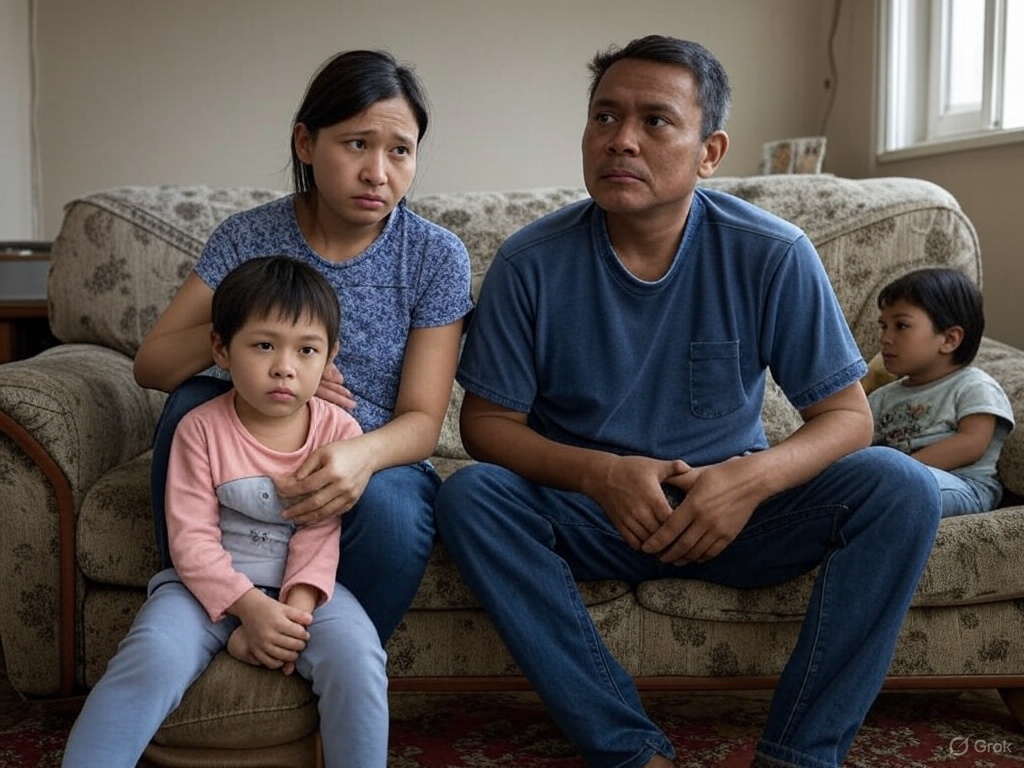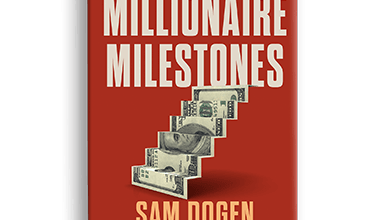The Precarious Life of Dual Unemployed Parents (DUPs)

With a likely recession and potentially stagflation on the horizon, I suspect many more families will join us as DUPs: Dual Unemployed Parents. Mass layoffs and company shutdowns will ripple through the economy.
According to USA Facts, there were approximately 38 million single-income households in 2022. According to the Bureau of Labor Statistics, there were about 10.9 million one-parent family groups with children under 18 in 2022. While the exact number of single-income households with children is not directly reported, this figure highlights the prevalence of single-parent families.
The quick math highlights that if 5% – 10% of them get laid off in the next recession, we’re talking an increase of at least 550,000 to 1.09 million new involuntary DUPs. Given there are plenty of households who co-habitate and are not officially married, the numbers are likely higher.
To help households who might find themselves in a similar situation, I wanted to share our experience. I’ll discuss our biggest concerns as DUPs since 2017 and how we manage to survive bear markets, recessions, and even self-inflicted wounds from our own government.
DUPs are households where both parents are without traditional jobs. These families face the challenge of raising children and managing household expenses without the stability of regular paychecks.
Some parents become DUPs involuntarily due to job loss. Others become DUPs by choice—part of the FIRE movement—opting to retire early, forsake maximum earnings, and focus on family life.
If you choose the DUP life, it’s because you value time with your kids more than job security, status, or money. But there’s no denying the financial risk and stress involved. It can be extremely hard to stay DUPs, especially during a downturn.
That’s why many in the FIRE community with kids still rely on one working spouse, who brings in steady income, healthcare, and retirement benefits. Some retired men with working wives call their situation WIFI, which stands for Wife Financial Independence. As more women become primary breadwinners, WIFI has become more common.
Becoming an involuntary DUP is a precarious position to be in. Here are some potential negative repercussions if both parents are unemployed for too long.
The Potential Repercussions Of A Dual Unemployed Parent Household
Financial Strain: Unemployment for both parents can lead to significant financial difficulties, making it hard to cover basic needs like housing, food, and healthcare. If both are unemployed long enough, this could lead to multi-generational cycle of poverty.
Child Development: Studies suggest that parental unemployment can negatively affect children’s cognitive, emotional, and social development, especially during early childhood according to the Bureau Of Labor Statistics. Think about all the times you’ve lashed out at your children due to stresses at work.
Educational Outcomes: Unemployment can impact a family’s ability to provide a supportive environment for children’s education, potentially leading to lower school performance and educational attainment according to Oxford Academic. If your kids don’t do well in school, their employment opportunities decline.
Stress and Mental Health: The financial and emotional strain of unemployment can negatively impact the mental health and well-being of both parents and children according to the National Institute Of Health. Ongoing mental stress and anguish as involuntary DUPs is not talked about enough. Depression and even thoughts of suicide can result, as parents feel like there’s no hope.
Parents often experience an indescribable mix of stress, guilt, and shame if they feel they can’t provide. It’s already tough being a single-income household with children in a bear market. But when both parents are out of work, investments are tanking, and friends are getting laid off, it can feel like you’re living through your own version of the Great Depression.
Harder to Be DUPs Than DUNKs
Being a DUP (Dual Unemployed Parents) is at least three times as stressful as being a DUNK (Dual Unemployed, No Kids).
When you only have yourself to worry about, life is simpler. You can cut food expenses—especially important with higher prices post-tariffs—skip the commute, and even crash on a sofa or sleep in a tent if needed. But when you have children to protect, starving them, pulling them out of school, or having them sleep on the floor becomes emotionally unbearable.
It’s the mental pressure of being a provider that really weighs you down. Even parents with the strongest Provider’s Clock may break down after prolonged unemployment. For some men especially, we feel it is our duty to provide. If we cannot properly take care of our family, we can feel like total failures. This perpetual fear of feeling like a fear is one of the main reasons why I have saved so aggressively for so long.
Looking back on my journey, reaching FIRE before having children felt far easier than staying FIRE’d with children in the picture.

How to Survive as Dual Unemployed Parents (DUPs)
The economic damage from this self-inflicted downturn will likely be severe for millions of families. Losing money in your investments is one thing. Having to delay retirement by years is another. But losing your livelihood is the ultimate damage.
Historically, bear markets have averaged a 36% decline and lasted about two years. Your mission is to survive, both emotionally and financially, for at least that long.

Here are some strategies to help you weather the storm. I strongly believe that surviving as DUPs is ~40% getting your mental health right. The demons in your head can overwhelm you if you are not careful.
1) Remind Yourself: “It’s Not My Fault.”
One of the most important things to do when both parents are unemployed is to extend yourself grace. Say it out loud: “It’s not my fault.” Then say it again every day and night as long as you need to.
You likely didn’t cause your company’s losses or make the decision to lay off hundreds of workers. You definitely weren’t the one who decided to purposefully tank the stock market and throw the global economy into a tailspin.
It’s also not your fault that you dollar-cost averaged into your children’s investment accounts or your own—only for the market to keep sliding. Timing the bottom is nearly impossible, and the market will eventually rebound. You were thinking of everyone’s future when you made those investment decisions, sacrificing consumption now for a better tomorrow.
And that spring break family vacation you took before getting laid off? That wasn’t irresponsible—it was a memory-making experience for your kids. You didn’t know what was coming, and you wanted them to enjoy their time.
You are not at fault. Your spouse or partner is not at fault. You’ve both done your best to earn a living and take care of your family.
It is crucial not to blame yourself or each other for the unfortunate situation you’re in. Now is the time to support one another and move forward as a team. Be each other’s rocks. Remember, the marriage vow you may have took, “To have and to hold, from this day forward, for better, for worse, for richer, for poorer, in sickness and in health, to love and to cherish, until death do us part.”
2) Drill Down On Your Monthly Burn Rate
Now that income has stopped, knowing exactly how much you’re spending becomes mission critical. Pull up your last 3–6 months of expenses and sort them into categories: fixed (mortgage, insurance), variable (groceries, gas), and discretionary (streaming services, takeout, non-essentials).
Slash the discretionary expenses without hesitation. Keep the basics, and look for renegotiation opportunities—think insurance, mobile phone bills, utilities, and even property taxes. Every $100 cut per month is $1,200 saved per year, which may buy you another month of runway when you’re living on reserves.
Use this opportunity to turn budgeting into a teaching moment for your kids. I’ve found that when you take the time to explain why you’re cutting back, children are surprisingly understanding. Instead of just saying “no,” walk them through the reasoning. The next time you tell them you can’t buy something or go somewhere due to the budget, they’ll get it—and there’ll be less resistance.
Even better, make downsizing a team activity. Turn it into a game where everyone pitches in with ideas to save money. When kids feel like they’re part of the solution, they’re more likely to cooperate—and maybe even have some fun along the way.
3) Set Aside “Work Hours” to Find Work
After filing for unemployment, you’ll need to actively search for a job to continue receiving benefits. Set aside one or two hours each morning to focus solely on job hunting.
Finding a job during a recession or stagflation can be particularly challenging due to the surge of highly qualified candidates competing for limited opportunities. Relying solely on job sites is often ineffective—sending out hundreds of resumes might yield only one or two responses.
In a recession, job hunting is a numbers and relationship game. The more effort you put into networking and building connections, the greater your chances of success. That said, given that recessions typically last anywhere from six months to two years, it’s important to mentally commit to a prolonged job search, knowing that it may take time to secure a new opportunity.
Food banks, free school lunch programs, religious organizations, and local mutual aid groups exist for a reason. There’s no shame in asking for help—especially when it can ease your burden as a parent. I’m certain as a Financial Samurai reader, you’ve given way more than you’ve received. It’s time to ask for help when you’re most in need.
If your kids are young, check for free preschool, subsidized childcare, or enrichment programs. For older kids, many community centers offer free or low-cost afterschool care and meals. You should also consider reaching out to other families at your children school too see if you can pull resources or help.
The more you lean on the village, the longer you can stretch your resources. If you’re not yet an involuntary DUP, please do your best to strengthen your village.
5) Turn Your Skills Into Cash Flow
Even if you’re out of your traditional job, there are likely ways to generate income from home. Offer freelance services online (writing, design, tutoring, coding, etc.). Sell unused items on Craigslist or Facebook Marketplace. Rent out a room. Pet sit. House sit. Drive for a delivery service in your spare time.
The goal isn’t to match your previous income. It’s to create some breathing room and feel useful. I’ve done everyone one of these side gigs and my wife has taught violin lessons. I even took on a part-time job at a startup for four months after exhausting our liquidity due to a house purchase.
Swallow your pride. You must do anything you can to survive. Several hundred dollars a month here and there can cover groceries or offset healthcare premiums. The more side hustle income you can earn as DUPs, the greater your chances for a recovery as the economy eventually rebounds.
6) Barter and Swap With Other Families
In lean times, social capital becomes even more important. But in order to have social capital, you must be a kind and helpful person in your community. If you aren’t DUPs yet, consider doing more volunteer work and participating more in your children’s school activities.
Trade babysitting with a neighbor so both sets of parents get some sanity time. Lend out tools or toys in exchange for groceries or help fixing something. Pool bulk buys (like Costco trips) to lower costs for all. Car pool. When cash is tight, barter systems and trusted relationships can help keep you afloat.
In a recession, most families are losing money. Therefore, given they’re all in the same boat, most families would be happy to find ways to help each other out to save time and money.
7) Reframe Your Time Off As a Gift With Your Children
Yes, the stress of both of you not having jobs is real, but try reframing the unexpected break as a once-in-a-lifetime opportunity. Your kids are only little once. You will likely never get this concentrated family time again. That doesn’t mean you ignore financial survival, but emotionally, this shift in mindset can prevent resentment from growing in your household.
Turn after-school walks into teachable nature lessons. Make cooking and cleaning a family event. Read together every night. Volunteer at as many school events as possible. Explore your local sites when your kids have school breaks. You may be hurting for money, but you’re rich in time, an asset many working parents don’t get.
As older parents, we chose the DUP life to make up for lost time. One of my regrets is having children about four years later than I would’ve liked. But sometimes biology and life get in the way. Those four extra years mean I’ll likely have four fewer years with them on the backend of life, which is why I’m now doing everything I can to be there for them now.
Surprisingly, the quest to make up for lost time has been easier than expected, mainly because kids today have so much time off from school. With 48 days off per year excluding summer break for our school, it sometimes feels like we’re going on family trips. So if you’re worried that FIRE’ing with kids will crimp your retirement lifestyle, don’t be. It might not be nearly as restrictive as you imagine.
As a DUP, I firmly believe you will cherish the time you have with your kids far more than you will appreciate having more money. Remember during COVID lockdowns? How awesome was that to be able to develop so much quality time with your little ones? Priceless!
8) Get Comfortable With “Good Enough” Parenting
You may feel guilty for not being able to provide everything your children had before, or everything you hoped they would have. But remember: stability, attention, and love go a lot further than enrichment classes or brand-name shoes.
Your kids will remember how you made them feel during this time, not whether they got an iPad upgrade or went to a fancy camp. Instead of paying $80/hour for private lessons, you can become Coach Daddy or Coach Mommy since you have time.
Importantly, do your best to shield your kids from the sinking feeling that comes with a worsening economy and a falling stock market. They’re perceptive, and they’ll pick up on your stress if it spills over. Kids notice everything, even if they don’t say so.
It’s equally important not to project too much of your fear or sadness onto your spouse. Chances are, they’re carrying just as much fear and uncertainty as you are. In tough times, emotional support and calm leadership go a long way.
My biggest shortcoming as a husband, family finance manager, and personal finance writer is that I’m always on top of the markets—often to a fault. When the stock market is crashing, I feel like Alex DeLarge in A Clockwork Orange, eyes pried open by lid locks, forced to watch the carnage unfold.
I want to look away, to relax and tune out, but I just can’t. One is because I’m responsible for keeping our finances afloat. Two because I want to provide the best value in my free weekly newsletter to help my readers. And that constant exposure can sour my mood and strain my relationship with my wife.
9) Stay in the Market, Even if It Hurts
If you’re in a decent cash position, resist the urge to sell your investments out of fear. Staying the course is one of the hardest things to do in a downturn, but it’s what ultimately helps you build wealth over time. Bear markets are when millionaires are quietly made.
Even if you can only invest a little, keep dollar-cost averaging into your retirement and kids’ 529, Roth IRA, and custodial accounts. You’ll thank yourself when the recovery eventually comes. Just remind yourself that you only need to survive for about two years and -36% drawdowns on average until better days return.

10) Prepare to Plan And Pivot Together
Discuss what Plan B (or C or D) looks like. Can one parent go back to work sooner than planned? Is relocation on the table? Could you downsize temporarily to free up capital? Having open, honest conversations—without judgment—can be a major relief and foster teamwork during a very isolating period.
When I left the workforce in 2012, I worried I had just made one of the biggest financial mistakes of my life. Even with a severance package in hand, I second-guessed walking away from a six-figure job at age 34. My wife and I even discussed selling our home and downsizing to a much smaller two-bedroom rental that cost 60% less. We put our house on the market in 2012, but fortunately, there were no takers as we scouted for cheaper rentals.
Since we couldn’t find a reasonable buyer, we pivoted and decided to rent out our garden room for $800–$1,100 a month over several years. At the same time, we created a survival game plan: Live like college students again for the next three years and save as much as possible. If our finances held steady after three years, my wife could also retire early by negotiating her own severance.
Thankfully, the economy recovered, Financial Samurai kept growing, and she was able to negotiate a severance and do part-time consulting with her old firm until our son was born in 2017.
Not everything will go according to plan, but having multiple contingency plans based on different outcomes dramatically increases your odds of surviving as DUPs and eventually thriving. If you have not done so already, please come up with your bear market investment game plan to survive the next one or two years.
I’m Still Stressed In A Bear Market As A Voluntary DUP
You might think that voluntary DUPs (or FIRE parents) are stress-free because their finances were strong enough to retire early with kids or then have kids. However, you’d be wrong for one key reason: the lack of active income as a safety buffer.
Even if you have enough passive income to cover your household’s basic daily expenses, you don’t have a steady cash flow to build up your reserves during extremely difficult times or take advantage of market dips, at least not as much as you may like. As a result, watching the economy struggle can leave you feeling helpless. And nobody wants to feel they can’t do anything to improve a bad situation.
That said, there are ways to address this, like lowering your safe withdrawal rate or picking up a side gig to bolster your funds. But since you’re highly reliant on your investments for survival, seeing your portfolio take a hit can feel especially painful.
My Disappointment Will Be Put To Good Use
My biggest challenge right now is accepting the sight of a year of savings and investment gains disappear in this latest bear market. And things could easily get worse!
Even though I’m well-diversified, the absolute dollar loss is greater than what I experienced during the 2008 Global Financial Crisis. Psychologically, it’s tough to handle, despite a larger net worth. I can’t help but feel disappointed in myself for not being more conservative after two years of incredible gains.
But circling back to point #1 about helping DUPs weather this downturn, I remind myself: this isn’t my fault. I can’t control the exogenous shocks that are wreaking havoc on the economy. What I can control is how I respond and the how I allocate our assets. I’m doing my best with what I’ve got, and I won’t quit on my family—because I can’t.
So you see, even if you think you have enough money to take care of your family, you will likely always worry.
Final Thoughts Of The DUPs Lifestyle
Whether by choice or circumstance, being a DUP demands emotional resilience, financial discipline, and a strong sense of family unity.
But here’s the truth: your kids aren’t keeping score. They don’t care about your job title, your income, or your investment returns. They just want you – your presence, your love, and your attention. And in a strange way, this economic downturn might become the very chapter that brings your family closer than ever before.
Stay strong. Stay connected. Take it one day at a time. The storm will pass. And when it does, I believe you’ll look back and feel grateful for all the quality time you shared with your little ones.
Readers, are any of you DUPs? If so, how did your household become one—voluntary or involuntary? How do you stay positive as a DUP during a recession? What are some other strategies to help dual no-income households survive tough times and make the most of life despite the challenges?
If you’re looking for an easy way to review your investment asset allocation and x-ray your stock portfolios for excessive fees, check out Empower. I’ve been using them since 2012 and they have one of the best free tools for analyzing your portfolio.
To expedite your journey to financial freedom, join over 60,000 others and subscribe to the free Financial Samurai newsletter. Financial Samurai is among the largest independently-owned personal finance websites, established in 2009. Everything is written based on firsthand experience and expertise because money is too important to be left up to pontification.
If you want to build more wealth than 93% of the population, pick up a copy of my upcoming bestseller, Millionaire Milestones: Simple Steps To Seven Figures.
Source: The Precarious Life of Dual Unemployed Parents (DUPs)




